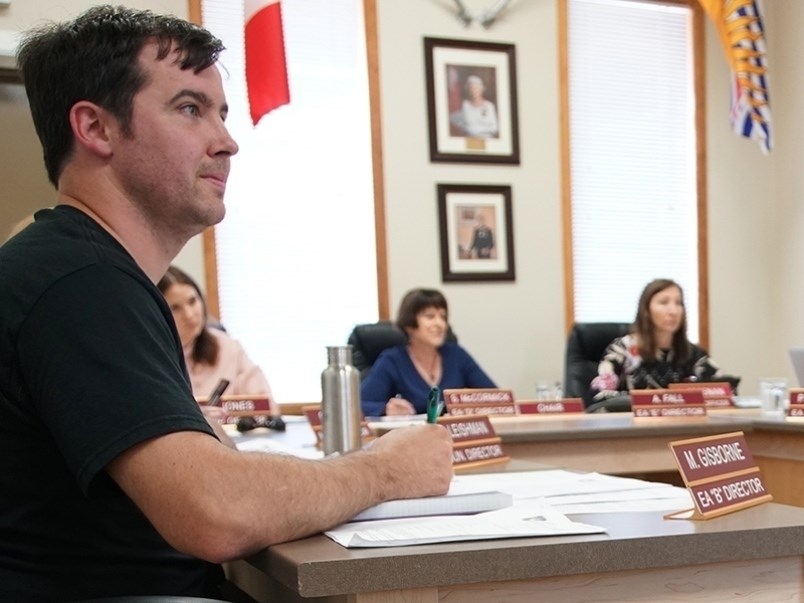qathet Regional District (qRD) board of directors will consider giving first two readings to a zoning bylaw for Random Road in Electoral Area C.
At the November 9 qRD planning committee meeting, directors also recommended the regional board direct staff to complete a secondary suite policy review report for a future meeting of the planning committee.
In discussion on the zoning bylaw, Electoral Area B director Mark Gisborne said he had attended all three public engagement sessions related to the Random Road zoning bylaw.
“I listened intently and heard what they had to say,” said Gisborne. “Now that it’s before the elected officials, it’s our turn to respond.
“There’s a couple of items in the staff report I’d like to address. The first is the petition itself. The regional district received a petition requesting a zoning bylaw, but the board was not provided a copy of the petition, only a certificate of sufficiency that was based on a non-applicable section of the Local Government Act.”
Gisborne said that had the regional district followed the principle of the section used in the act, it would not have been sufficient, because it requires more than 50 per cent of the properties that will pay for the service to sign the petition.
“That includes everyone from electoral areas A, B, C and D, which have to pay the price for such regulations,” said Gisborne. “The board passed a resolution on what I believe to be fragmented information, to accept the petition requesting to establish a low-density residential neighbourhood zone…”
Chair interrupts director
Electoral Area C director and planning committee chair Clay Brander said he was going to interrupt Gisborne because he didn’t see how the commentary was germane to the motion in front of the committee.
Gisborne said the committee did not receive information that was circulated for the petition, but he was provided a copy by several residents. He said he believes the petition contained some misinformation.
Brander said he thought Gisborne was straying away from the motion.
“We are being asked to endorse the Random Road zoning bylaw,” said Brander.
Gisborne said he believed it was the job of the elected officials to provide clear, accurate and correct information.
“We are supposed to debate and discuss the matter using the correct information,” said Gisborne. “Is that not germane to the discussion before us?”
Chief administrative officer Al Radke said if Gisborne would like to see the debate on what he termed as the facts, Radke said he recommended that Gisborne make a motion to table the motion so it can be brought back with the facts. Otherwise, Radke said he believed Gisborne was straying outside the boundaries, based on staff and their writings, and that should be for in camera discussions only.
Gisborne said he was referring to the petition, which was not written by staff.
Radke said Gisborne was referring to things he said staff neglected or omitted in providing. Radke said Gisborne could have asked for a copy of the petition.
“I don’t believe he’s reached out to any of our staff with any of his concerns prior to this meeting, so he is attacking staff and I’m not going to stand for it any longer,” said Radke.
Gisborne said he was not discrediting staff; he was referring to a petition.
Electoral Area A director Patrick Brabazon said Radke had offered a reasonable compromise to Gisborne. Brabazon said secondly, Gisborne is saying the staff has knowingly certified a false document.
“That, in my opinion, is an attack on staff,” said Brabazon.
Brander said he agreed and he was going to stop Gisborne unless Gisborne had something germane to the issue in front of the committee.
“The residents that participated repeatedly expressed that they wanted a zoning bylaw to restrict industrial uses,” said Gisborne. “There were mixed feelings on commercial operations, as there was already a commercial use in the neighbourhood. There was strong opposition to restricting accessory dwelling units. The public repeatedly requested that the zoning bylaw reflect their request of the original petition.”
Gisborne brings up survey
Gisborne said he also wanted to bring up a survey. He said surveys provided residents with an introduction of what a zoning bylaw can regulate. A survey question was: should the bylaw regulate groundwater and drainage protection, according to Gisborne. He said he was quoting the qRD planner, who stated qRD has no authority over water management or water licensing, which is under provincial authority.
“That results in confusion,” said Gisborne. “It’s outside the scope of the zoning bylaw.”
Manager of planning services Laura Roddan said the survey and the engagement provided questions and an opportunity for feedback on the range of features the zoning bylaw can regulate. She said Gisborne is correct that provincial agencies oversee and have the authority for licensing water and ensuring there is water quantity and quality.
“However, one of the key reasons for a zoning bylaw is to regulate land use and density,” said Roddan. “The Area C official community plan (OCP) very clearly describes the scenario where groundwater is the primary source of water for most neighbourhoods and is the source of water for the Random Road neighbourhood. Some are on the Pinetree improvement district and some have their own wells.
“The OCP makes it very clear we need to find a balance between the density of land use, the number of homes on a property that will not pose risks to a sustainable supply of groundwater to service those homes.”
Brander said he attended the public engagement sessions and was impressed with the way staff listened to those in attendance and massaged the bylaw to get it to a point where it was supported by those in attendance.
The committee voted to send the zoning bylaw to the regional board for first two readings, with Gisborne opposed. The committee also passed a motion for staff to complete a secondary suite policy review, which would pertain to the whole regional district.



